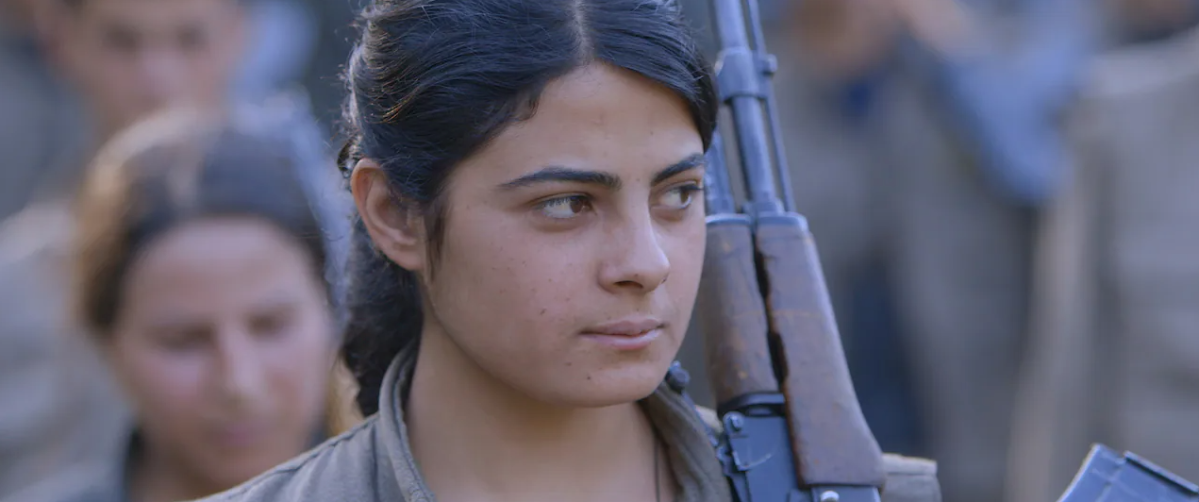The wave of recent films created by Kurdish women, depicting their lives and concerns in new ways, has garnered new attention following the tragic events in Iran last month, where a young Kurdish woman, Jîna (Mahsa) Amînî, died while in police custody in Iran after being arrested for wearing an ‘improper’ hijab. Authorities – in direct contrast to eyewitnesses at the scene – deny that the 22-year-old was violently beaten by police.
People the world over are now, rightfully, turning a keen eye on Iran, its rulers and its morality police, with protestors in Iran – and globally – demanding the end to the current political and clerical regime, which is hugely disadvantageous to women, and its replacement with democracy and equality for women.
One positive of such civil unrest and the issues driving it has been a more nuanced understanding of gender and racial politics in the region, while also busting the great myth of a monolithic ‘Middle-Eastern woman’. Female Kurdish filmmakers are using their art to challenge racist and sexist governments across the Middle-East, and Western prejudices that have wilfully ignored and undervalued the history of feminist resistance in the region.
Director Zaynê Akyol, an award-winning filmmaker of Kurdish origin, born in Turkey and raised in Quebec, has said previously that she wants to ‘make [audiences] more close to them [female Kurdish protagonists], to feel in some way what those women are feeling’.
Akyol’s most famous documentary, Gulîstan, Land of Roses (2016), followed the story of her visit to Iraq, seeking a young Kurdish-Canadian woman who had left to fight against ISIS, hoping to liberate her people who had suffered occupation and genocide under successive governments, including the Baʿath party.
Images of Kurdish women taking up arms against extremist Jihadists and oppressive governments have been circulating since the Iraq war, which began in 2003. In the West we may be aware of the fierceness and strength Kurdish women in the face of violent oppressors but we may, in turn, have been nudged towards a fetishisation of these women and their lived experiences. Take, for example, the late Ramazan Antar of The Kurdish Women’s Protection Units, who was labelled by tabloid press as the ‘Kurdish Angelina Jolie’ in 2016.
Films like Gulîstan, made by Kurdish women about Kurdish women, imbue the lives of these extraordinarily brave women with value and dignity in ways that sensationalist, Hollywood-type movies often do not.
Since objectification and appropriation of minority groups and First Peoples’ stories have become an increasing concern for the entertainment industry, these films by women of the Kurdish diaspora, made on their own terms, are a fine example of the way that documentary, when done sensitively by and with the people it purports to represent, can be informative and inspiring.
‘There are a lot of films that die before they ever see daylight, because of the constructs we have to work with,’ Beri Shalmashi, Kurdish film director, writer and producer told me in an interview earlier this year.
Read: The Exam serves a ‘politically backward’ view of Kurdistan
There are so many barriers to representation of women’s stories from the region due to the necessity of appealing to funding bodies that may be tied to governments in the region with conservative ideals, or production houses in Hollywood that might not represent these women’s stories most authentically, if they are interested at all.
But the recent events in Iran, and the global media coverage has shown that we are interested, and we are hungry to know more about these extraordinary women who put their bodies and lives at risk by resisting violent terrorists and corrupt government officials.
Shalmashi’s latest short film, Shouted from the Rooftops, follows the story of lovers separated by war, as Sherin (a woman) leaves her anguished male lover, Ferhat, to fight in the mountains to protect her village from genocide.
As a Western audience, it might strike us as a reversal of traditional Herculean story; in Kurdistan, women fight as fiercely for their freedom as the men, echoed in the rally call heard all over the world the past few weeks: ‘Jin Jiyan Azadi’ (‘Women Life Freedom’, in Kurdish).
Watch this space as, early last year, the rights to a TV version of Gayle Tzemach Lemmon’s book The Daughters of Kobani: A Story of Rebellion, Courage, and Justice were signed over to Hilary and Chelsea Clinton’s production company. ‘The Daughters of Kobani is an extraordinary account of brave, defiant women fighting for justice and equality’ the former US Secretary of State told the Hollywood Reporter at the time.
Hopefully Kurdish women will be part of the creative team and ensure that their stories are not further silenced or distorted through a Hollywood lens. Either way, as Kurdish women artists and filmmakers, our silence will not protect us.





